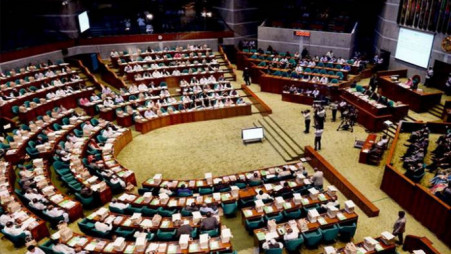CPD calls for scrapping 'Upper House' plan, warns of deeper parliamentary chaos
Presenting the keynote paper, CPD Research Director Dr Khondaker Golam Moazzem said the proposed Upper House lacks both logic and necessity in the country’s existing Westminster-style parliamentary system

The Centre for Policy Dialogue (CPD) today (9 October) recommended scrapping the proposed plan to introduce an Upper House in the next national parliament, saying the move will not bring any effective change but rather add further complexity to Bangladesh's parliamentary system.
The observation came at a seminar titled "Proposed Upper House in the National Parliament: Can it ensure accountability of the majority party?" held at a city hotel.
Presenting the keynote paper, CPD Research Director Dr Khondaker Golam Moazzem said the proposed Upper House lacks both logic and necessity in the country's existing Westminster-style parliamentary system.
He urged the National Consensus Commission to focus on essential reforms instead of pursuing discussions on creating a second chamber. "Instead of an 'Upper House', a 'Parliament Commission' could be formed to act as the third eye of the legislature," Moazzem suggested.
Sharing his experience, Moazzem said the speaker (of the Parliament) often feels powerless when making crucial parliamentary decisions. "A separate commission can empower the speaker and make parliament more effective," he added.
Pointing to the dominance of the ruling party under the current system, he said, "In Bangladesh's Westminster model, accountability is almost nonexistent. The majority party dominates nearly all law-making decisions – around 99% of the legislation."
Moazzem also highlighted that the parliament has around 50 committees, but most are largely ineffective.
"If these committees were truly functional, accountability in lawmaking would naturally follow. We can strengthen parliamentary accountability within the existing structure. There is no need for an Upper House," Moazzem said.
Supporting this view, Professor Nizam Ahmed of the University of Chittagong, another keynote speaker, called the rationale for the Upper House "weak and unconvincing".
He pointed out that under the current proposal, bills passed by the lower chamber would be sent to the Upper House for review, but the latter would have no authority to amend them.
"If the 'Upper House' can only make recommendations, how will it ensure accountability?" he questioned.
He also noted that while the Lower House would be elected through direct voting, the Upper House would use proportional representation, potentially giving the opposition more influence. "How the balance between the two chambers will work must be carefully examined."
However, Election Commission Reform Commission member Abdul Alim offered a partial defence of the concept, saying that a second chamber could help curb authoritarian tendencies. "If there's an Upper House, the ruling party cannot act autocratically. It will naturally create a sense of internal accountability," Alim said.
Still, he warned, the process might lead to political deadlocks and unnecessary duplication.
Presiding over the session, Prof Rounaq Jahan, a CPD Distinguished Fellow, emphasised the need for a Code of Conduct for Members of Parliament to strengthen accountability within the existing system.
She urged policymakers to fix the flaws in the current framework before experimenting with a new one



 Keep updated, follow The Business Standard's Google news channel
Keep updated, follow The Business Standard's Google news channel
















